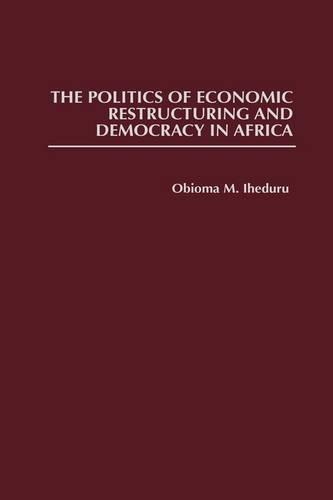
The Politics of Economic Restructuring and Democracy in Africa
(Hardback)
Publishing Details
The Politics of Economic Restructuring and Democracy in Africa
By (Author) Obioma M. Iheduru
Bloomsbury Publishing PLC
Praeger Publishers Inc
30th June 1999
United States
Classifications
Tertiary Education
Non Fiction
Political structures / systems: democracy
Development economics and emerging economies
330.96
Physical Properties
Hardback
184
Description
In a bold attempt to develop an innovative theory of political change arising from dual economic and political transformations, Iheduru maintains that economic structural adjustment policies have unintended political consequences, leading to democratic liberalization in post-colonial African states. Using classical, dependency, and neoliberal approaches as a backdrop, he demonstrates that structural adjustment policies shaped by conditionality measures foster the operation of free-enterprise market forces. As a social consequence of the reform effort, winners and losers organize to protect their interests, first in the economy and later in the political arena. Thus the structural reorientation of African economies leads not only to the ascendancy of the market and economic growth but also to the political opening of the African state, thereby facilitating the participation of excluded groups. In conclusion, Iheduru predicts that structural adjustment is the best policy alternative for initiating and sustaining meaningful economic changes in Africa. Moreover, he claims, it may be a deciding factor in the possible democratizing of the African continent, which would provide an auspicious atmosphere for a properly functioning market economy.
Reviews
"Professor Iheduru provides valuable insight into how structural adjustment contributes to democratization in Africa--contrary to expectation--by shrinking bloated state structures, activating civil society, and revamping the political and economic roles of government and elites. This book provides valuable insight into the processes of democratization in developing countries."-John A. Booth Regents Professor Department of Political Science University of North Texas
"This monograph provides a timely, original perspective on the impacts of economic reforms in African state roles and capabilities suggesting enhanced prospects for democracy, especially civil society, once the state is redefined and restructured. It constitutes a welcome contribution to African and Development Studies and to comparative and and global Political Economy at the dawn of the new millennium."-Timothy M. Shaw Professor of Political Science and International Development Studies Dalhousie University-Nova Scotia
Anyone interested in the recent economic and political changes in this often ignored region would do well to read this book.-Choice-Social & Behavioral Sciences
The book is useful for those who would like to understand Africa's economic problems and their root causes.-South African Journal of International Affairs
"The book is useful for those who would like to understand Africa's economic problems and their root causes."-South African Journal of International Affairs
"Anyone interested in the recent economic and political changes in this often ignored region would do well to read this book."-Choice-Social & Behavioral Sciences
Author Bio
OBIOMA M. IHEDURU is Assistant Professor of Political Science at Fort Valley State University./e His research interests include economic and development policy, comparative political economy, public management, and privatization and democratization with a regional focus on Nigeria and Africa.
